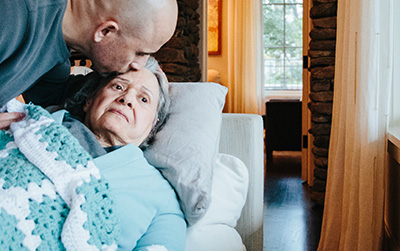
One of the subjects that comes up in my office is the ongoing sadness of children caring for their parents who are suffering from Alzheimer’s. One of my client’s comments went like this: “I’m the primary caretaker for my aging mother who is suffering from advanced Alzheimer’s. Unlike death, where you grieve and then in time return to your daily routine, dealing with my mother is like being stuck in an endless cycle of grieving. She doesn’t recognize any of us, so it’s like we don’t have her anymore, and every day the mourning starts all over again. It’s almost too much to bear.”
I had to sit back for a minute to take it all in. Alzheimer’s is an emotional roller coaster. The mind as well as the body are under relentless attack. It’s like dealing with a loved one who dies and then comes back over and over again.
It may sound simplistic, but sadly, it is what it is. Intellectually, as my client, she knows that nobody can cure her mother’s illness. But it’s natural to deny it: “No, it can’t be so. It just can’t be!” But it is, and it’s not healthy to hold on to what can never be.
In my years counseling people who have loved ones with Alzheimer’s, I’ve learned several things. First, try to spread out the amount of time spent with the loved one. There’s no “right” number of hours to spend, but the time will increase as you build emotional stamina. Pay attention to how you’re feeling after each visit and ask yourself if it was too long.
Beware of unearned guilt, i.e., feeling guilty about something over which you have no control. Though you didn’t cause the illness, you’re still going to feel guilty when you’re forced to deal with it. Sometimes a parent who was always sweet and loving can become hostile. In these cases, many people feel guilty about backing away or being distant. “I never had this kind of relationship with her before.” Well, of course you didn’t. For all those non-Alzheimer’s years, she was sweet and kind, so you shouldn’t feel guilty when you’re forced to change your tone in response to her atypical behavior.
Thirdly, NEVER take things personally. Many people find it helpful to think of the loved one as either “here” or “gone,” depending on their state of mind at the moment. I’ve heard people say, “I went to visit mother today. I was hoping she’d be there, but she wasn’t.” In a sense, you have to tell yourself, “That’s OK. It’s not really her.” And it’s true: The parent you always knew isn’t in the room right now. In early stages of the disease, the “presence” or “absence” can switch within a single conversation, so be ready. It’s natural to take it personally: “Why is he doing this?” But sadly, your loved one is no longer in control.
Fourth, don’t try to reason with an Alzheimer’s patient when he or she is “not there.” It will end up frustrating the both of you. Often it’s better to simply go with the delusions rather than fight them, as long as no physical harm comes from it. Get into their world, embrace it, and don’t fight it. If they’re talking about something that doesn’t make sense, just say things like, “Wow, that sounds interesting.” Don’t try to convince them they’re wrong. It will only intensify your frustration.
Lastly, give yourself permission to feel sad, but remember that life must go on. You have to be strong for their sake. Manage your stress. Delegate to others. And plan your time. And for goodness sake don’t give up everything you enjoy just because your loved one is ill. There’s no virtue in that sort of “selflessness.” You can’t change what you can’t change, so you should work to take care of yourself.
It’s a tragedy, but it’s also a life passage. Deal with it guiltlessly. When the end does finally come, you will be strong enough to help your loved one make a dignified and graceful exit.
